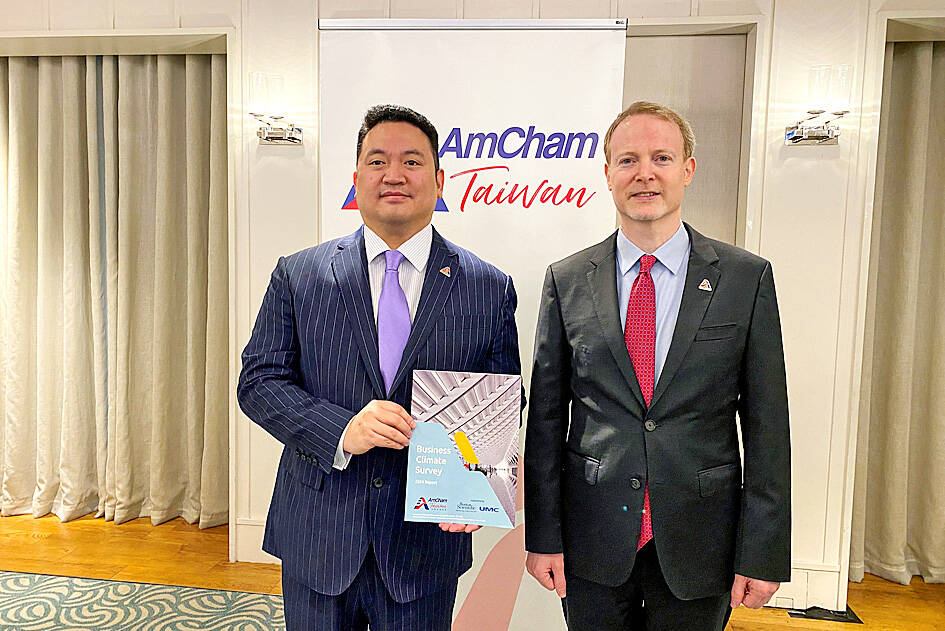Most US firms in Taiwan have expressed a high level of confidence in the local economy and their own business prospects for the coming year and beyond, as Taiwan emerges from a post-COVID-19 pandemic dip, the American Chamber of Commerce Taiwan (AmCham) said yesterday.
The chamber of more than 580 companies reached that conclusion after an annual poll found that more than 80 percent of companies voiced confidence in the economic outlook this year and an even higher 85 percent are positive about the next three years.
Meanwhile, nearly 83 percent are optimistic about their revenue prospects in the coming 12 months and 87 percent are confident over the next three years.

Photo: Ben Blanchard, Reuters
“Members are committed to the [local] market, with 92 percent saying they plan to maintain or increase investment in Taiwan this year,” AmCham chairman Dan Silver said.
The survey informs the chamber’s advocacy agenda for the coming year and serves as a resource for the Taiwanese and US governments, as well as others interested in US-Taiwan economic relations.
Despite the sentiment uptick, satisfaction with the regulatory environment has remained stagnant, as 43 percent said that regulations are not updated sufficiently in response to changing needs.
AmCham called on the government to make exceptional efforts to reduce bureaucracy and fine-tune regulations.
Meanwhile, 71 percent of companies expressed concern over the availability of green energy and 39 percent urged the government to make energy sufficiency its top priority.
In line with the nation’s pursuit of net zero carbon emissions by 2050, 61 percent of US companies here have formally committed to achieving net zero emissions and using 100 percent renewable energy, the survey found.
Though national security and cross-strait relations are considered important, a majority said they had not been significantly disrupted by increased tensions last year, although 35 percent said they are revising business continuity plans to address the geopolitical climate.
As for human capital, 55 percent reported plans to expand their workforce this year, it said, adding that companies urged the government to prioritize talent development and retention to maintain international competitiveness.
While appreciative of the nation’s stable and safe environment, AmCham members are concerned about road safety, quality of old buildings, the aging population and regulations that fall short of meeting economic needs.
In addition, a big majority, 72 percent, consider it important to their business that Taiwan secured a bilateral trade agreement with the US, the nation’s second-largest trading partner.
Members view the chapter on good regulatory practices as the most important section for their business, it said.
Support is widespread for the signing of a second agreement and swift implementation of the US-Taiwan Initiative on 21st-Century Trade, it said.

FALSE DOCUMENTS? Actor William Liao said he was ‘voluntarily cooperating’ with police after a suspect was accused of helping to produce false medical certificates Police yesterday questioned at least six entertainers amid allegations of evasion of compulsory military service, with Lee Chuan (李銓), a member of boy band Choc7 (超克7), and actor Daniel Chen (陳大天) among those summoned. The New Taipei City District Prosecutors’ Office in January launched an investigation into a group that was allegedly helping men dodge compulsory military service using falsified medical documents. Actor Darren Wang (王大陸) has been accused of being one of the group’s clients. As the investigation expanded, investigators at New Taipei City’s Yonghe Precinct said that other entertainers commissioned the group to obtain false documents. The main suspect, a man surnamed

DEMOGRAPHICS: Robotics is the most promising answer to looming labor woes, the long-term care system and national contingency response, an official said Taiwan is to launch a five-year plan to boost the robotics industry in a bid to address labor shortages stemming from a declining and aging population, the Executive Yuan said yesterday. The government approved the initiative, dubbed the Smart Robotics Industry Promotion Plan, via executive order, senior officials told a post-Cabinet meeting news conference in Taipei. Taiwan’s population decline would strain the economy and the nation’s ability to care for vulnerable and elderly people, said Peter Hong (洪樂文), who heads the National Science and Technology Council’s (NSTC) Department of Engineering and Technologies. Projections show that the proportion of Taiwanese 65 or older would

The government is considering polices to increase rental subsidies for people living in social housing who get married and have children, Premier Cho Jung-tai (卓榮泰) said yesterday. During an interview with the Plain Law Movement (法律白話文) podcast, Cho said that housing prices cannot be brought down overnight without affecting banks and mortgages. Therefore, the government is focusing on providing more aid for young people by taking 3 to 5 percent of urban renewal projects and zone expropriations and using that land for social housing, he said. Single people living in social housing who get married and become parents could obtain 50 percent more

Democracies must remain united in the face of a shifting geopolitical landscape, former president Tsai Ing-wen (蔡英文) told the Copenhagen Democracy Summit on Tuesday, while emphasizing the importance of Taiwan’s security to the world. “Taiwan’s security is essential to regional stability and to defending democratic values amid mounting authoritarianism,” Tsai said at the annual forum in the Danish capital. Noting a “new geopolitical landscape” in which global trade and security face “uncertainty and unpredictability,” Tsai said that democracies must remain united and be more committed to building up resilience together in the face of challenges. Resilience “allows us to absorb shocks, adapt under